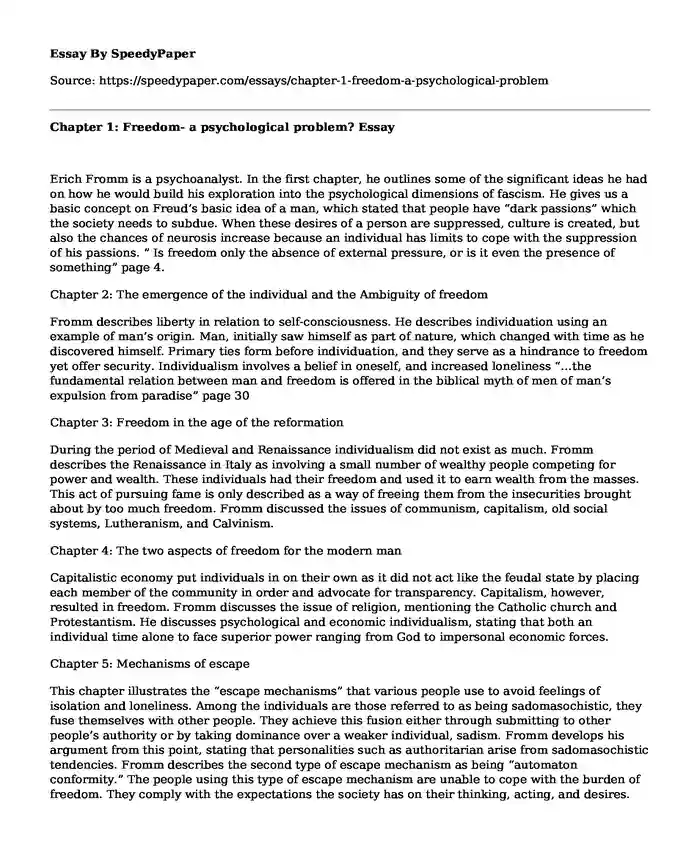
| Type of paper: | Book review |
| Categories: | Psychology Business Food Career Writers |
| Pages: | 3 |
| Wordcount: | 683 words |
Erich Fromm is a psychoanalyst. In the first chapter, he outlines some of the significant ideas he had on how he would build his exploration into the psychological dimensions of fascism. He gives us a basic concept on Freud's basic idea of a man, which stated that people have "dark passions" which the society needs to subdue. When these desires of a person are suppressed, culture is created, but also the chances of neurosis increase because an individual has limits to cope with the suppression of his passions. " Is freedom only the absence of external pressure, or is it even the presence of something" page 4.
Chapter 2: The emergence of the individual and the Ambiguity of freedom
Fromm describes liberty in relation to self-consciousness. He describes individuation using an example of man's origin. Man, initially saw himself as part of nature, which changed with time as he discovered himself. Primary ties form before individuation, and they serve as a hindrance to freedom yet offer security. Individualism involves a belief in oneself, and increased loneliness "...the fundamental relation between man and freedom is offered in the biblical myth of men of man's expulsion from paradise" page 30
Chapter 3: Freedom in the age of the reformation
During the period of Medieval and Renaissance individualism did not exist as much. Fromm describes the Renaissance in Italy as involving a small number of wealthy people competing for power and wealth. These individuals had their freedom and used it to earn wealth from the masses. This act of pursuing fame is only described as a way of freeing them from the insecurities brought about by too much freedom. Fromm discussed the issues of communism, capitalism, old social systems, Lutheranism, and Calvinism.
Chapter 4: The two aspects of freedom for the modern man
Capitalistic economy put individuals in on their own as it did not act like the feudal state by placing each member of the community in order and advocate for transparency. Capitalism, however, resulted in freedom. Fromm discusses the issue of religion, mentioning the Catholic church and Protestantism. He discusses psychological and economic individualism, stating that both an individual time alone to face superior power ranging from God to impersonal economic forces.
Chapter 5: Mechanisms of escape
This chapter illustrates the "escape mechanisms" that various people use to avoid feelings of isolation and loneliness. Among the individuals are those referred to as being sadomasochistic, they fuse themselves with other people. They achieve this fusion either through submitting to other people's authority or by taking dominance over a weaker individual, sadism. Fromm develops his argument from this point, stating that personalities such as authoritarian arise from sadomasochistic tendencies. Fromm describes the second type of escape mechanism as being "automaton conformity." The people using this type of escape mechanism are unable to cope with the burden of freedom. They comply with the expectations the society has on their thinking, acting, and desires. "Both masochistic and sadistic strivings tend to help the individual to escape his unbearable feeling of aloneness and powerlessness" page 150.
Chapter 6: The psychology of Nazism
In this chapter, Form argues that a more significant part of the German masses is sadomasochistic hence the susceptibility to manipulation by Adolf Hitler's Nazi ideology. Fromm demonstrates extensively in this chapter how Hitler had a desire to dominate over the weak and at the same time a willingness to give him up for the benefits of a higher power. "It seems that nothing is more difficult for the average man to bear than the feeling of not being identified with a larger group" page 208.
Chapter 7: Freedom and democracy
This chapter highlight two main topics; the illusion of individuality and freedom and spontaneity. It focuses on how individuals practice conformist thinking in modern democratical societies such as America. Fromm goes further to explain what an ideal free organization might appear. He believes that such a community is one that can encourage the ability and freedom of individuals to think for themselves and make their own decisions concerning matters affecting them. "Modern man is starved for life. But since, being an automaton, he cannot experience life in the sense of spontaneous activity" page 254.
Cite this page
Chapter 1: Freedom- a psychological problem?. (2023, Mar 04). Retrieved from https://speedypaper.com/essays/chapter-1-freedom-a-psychological-problem
Request Removal
If you are the original author of this essay and no longer wish to have it published on the SpeedyPaper website, please click below to request its removal:
- Essay Example on Inspirational Ways to Write More
- Free Essay: Audience Assessment of Columbia Accident Investigation Board
- Essay Sample on Summary of the Argument of Roger Cruton and Frederick Engels
- Essay Example: Meta-Analysis Design Research
- Essay Sample on the Document Slave Revolt in West Indies
- Free Essay on the Space of the Text in The New Dress: Literary Form and Structure
- Paper Example on What Marketing Entails
Popular categories




